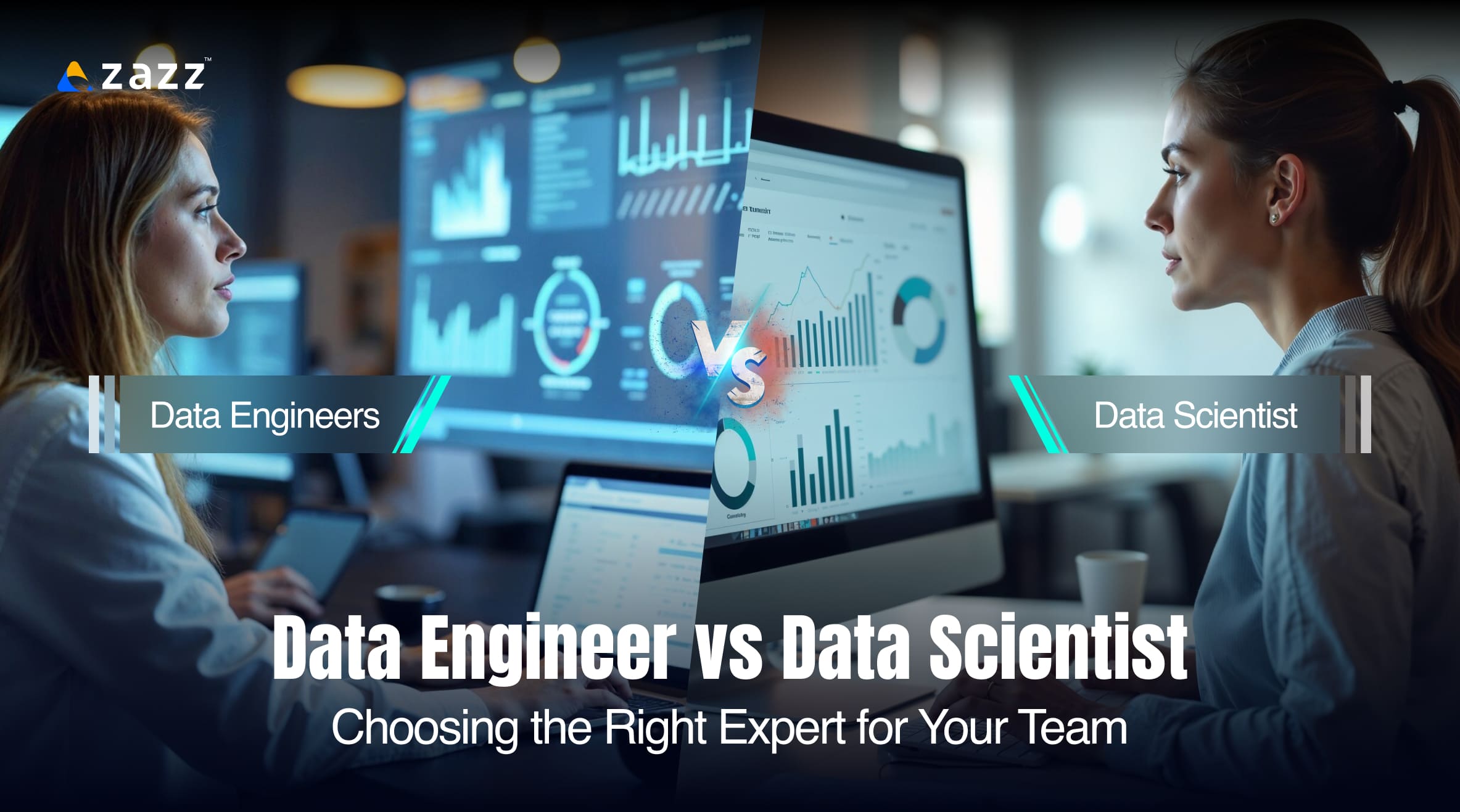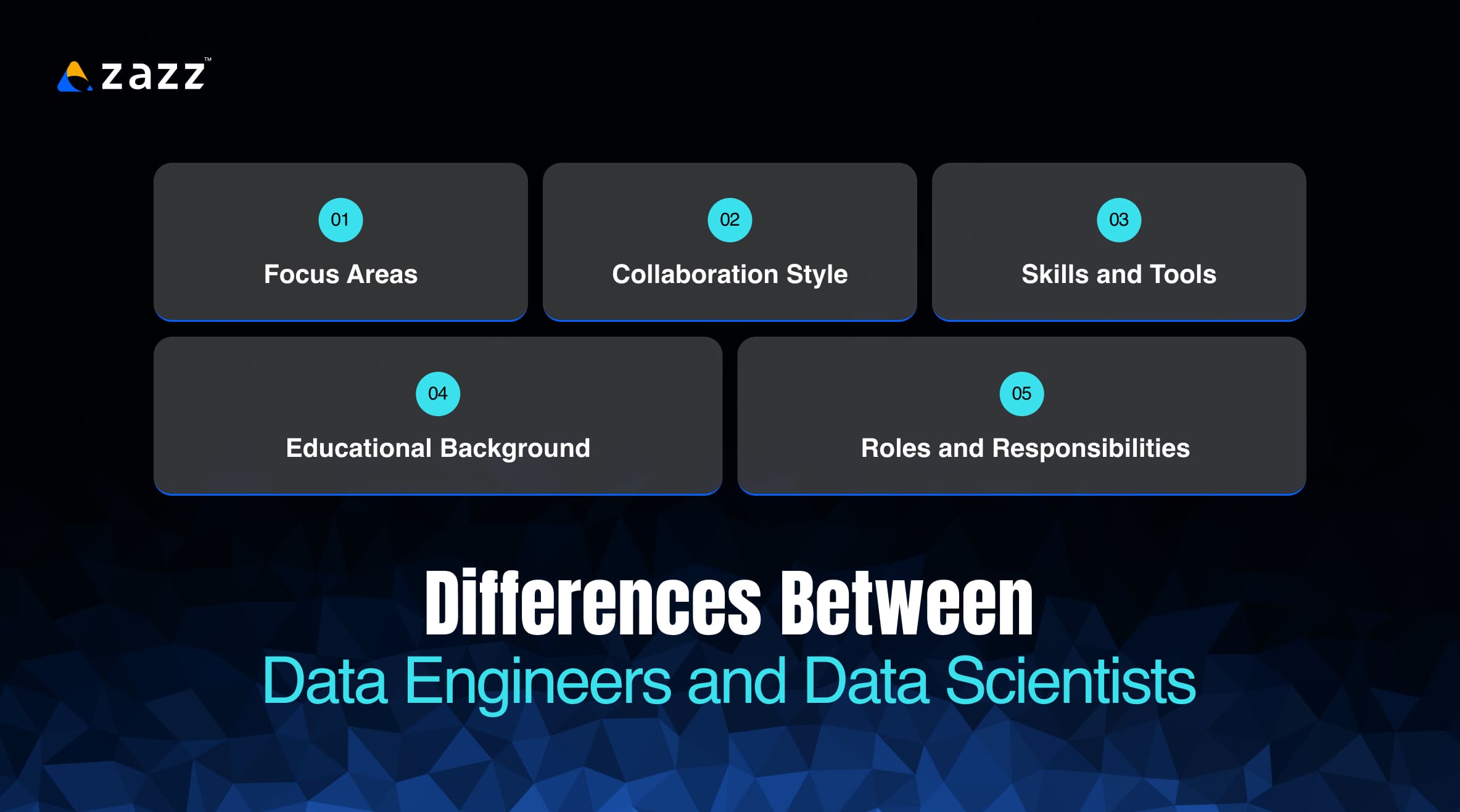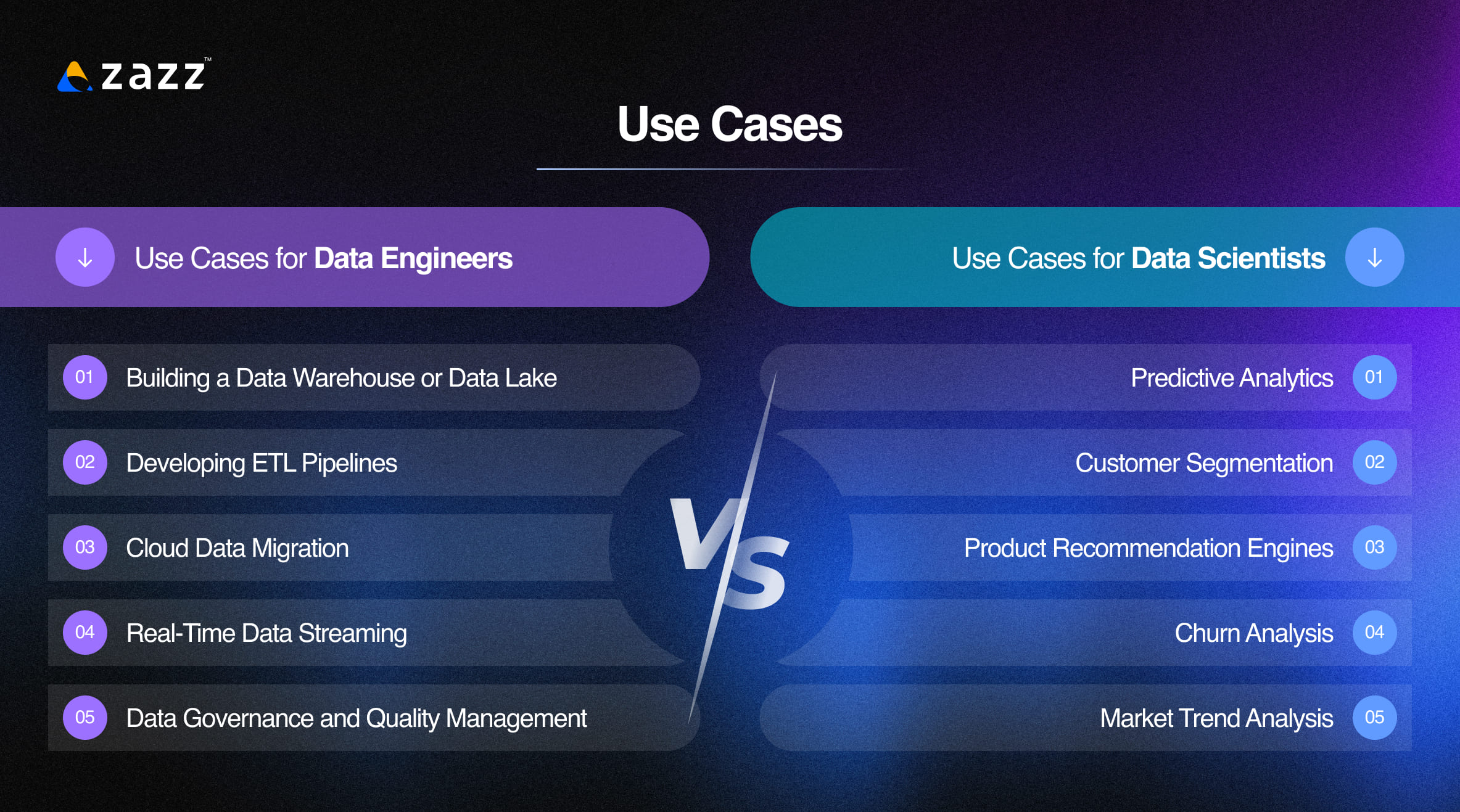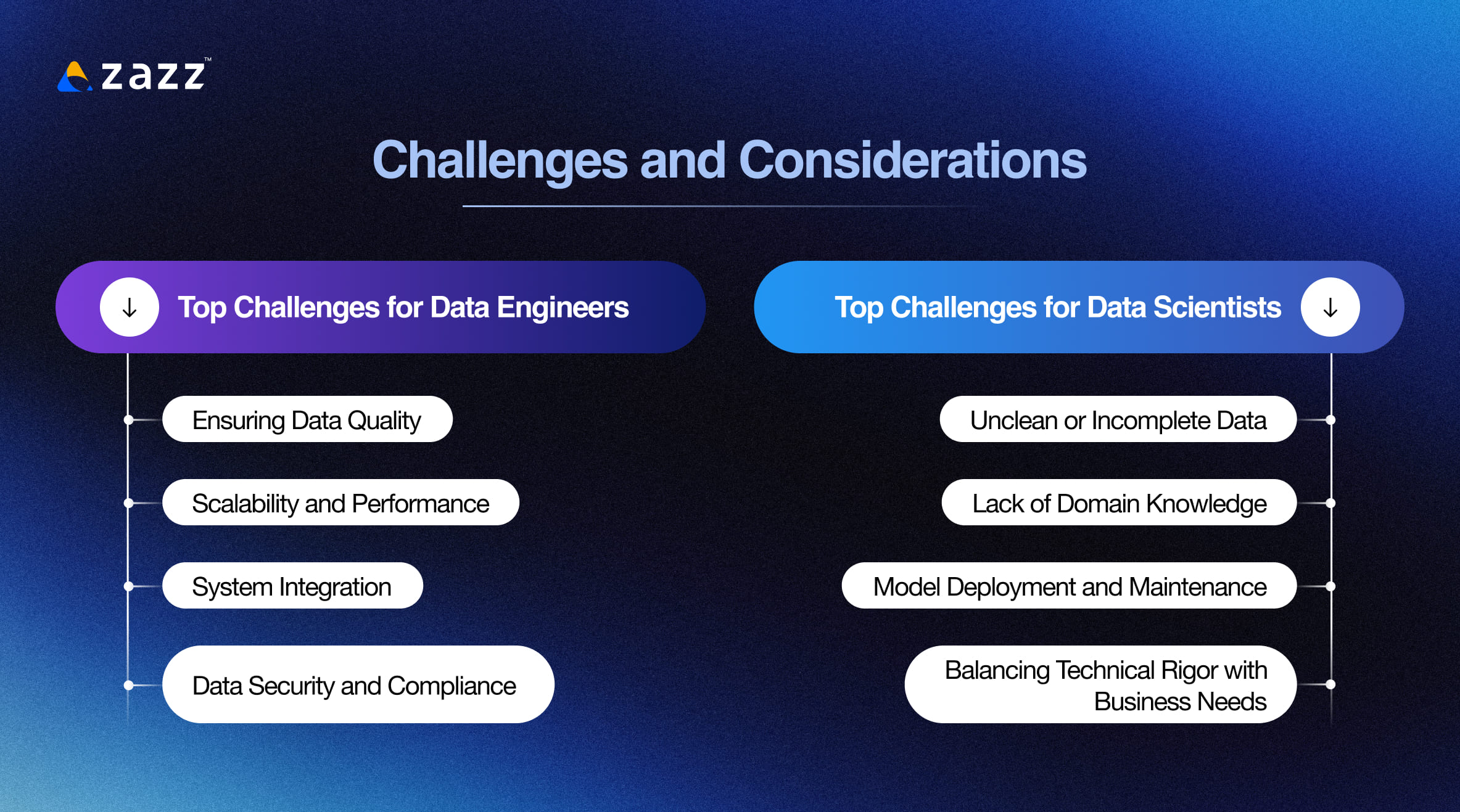
As businesses grow and scale, so does the volume of data they generate. But having data is just the beginning—turning it into actionable insights requires the right expertise. This is where two key roles come into play: data engineers and data scientists. Though they often work closely together, their skill sets, responsibilities, and impact on your business can be quite different.
Whether you’re building a data team from scratch or looking to expand your existing capabilities, understanding the difference between a data engineer and a data scientist is crucial.
In this blog, we’ll demystify the data engineer vs data scientist differences, clarify how their expertise aligns with specific business goals, and empower you to make an informed decision about which role (or combination) will drive your organization’s success. Let’s dive in.
Data Engineer vs. Data Scientist: Understanding the Meaning
A data engineer is responsible for designing, building, and maintaining the systems and infrastructure that allow organizations to collect, store, and process large volumes of data. They lay the foundation for data collection and analysis by ensuring that the right data is accessible, clean, and structured for use by analysts, data scientists, and business intelligence teams.
A data scientist interprets complex data and turns it into actionable insights using a combination of statistics, machine learning, and business knowledge. Their role is more analytical and strategic—focused on using data to drive decision-making, identify patterns, and forecast future trends.
This foundational overview highlights a core difference between data engineer and data scientist—the former builds the systems, while the latter finds value in the data.
Related reading: IT Project Outsourcing vs. IT Staff Augmentation
Top 5 Differences Between Data Engineers and Data Scientists

While both roles are crucial to a successful data strategy, the data engineer vs data scientist differences lie in their focus areas, tools, responsibilities, and more. Understanding these differences is essential for businesses that are looking to build or expand their data teams.
1. Data Engineer vs. Data Scientist: Focus Areas
Data Engineers are the backbone of any data-driven operation. Their primary focus is on building and managing the infrastructure that collects, stores, and processes data. This includes setting up data pipelines, designing strong data architectures, and maintaining seamless integration between various data sources. They optimize systems for performance, scalability, and reliability so that downstream users always have clean, consistent, and accessible data to work with. Without this solid foundation, meaningful analysis becomes nearly impossible.
Data Scientists, by contrast, focus on making sense of the data once it’s accessible and reliable. Their job is to extract insights by applying statistical models, machine learning algorithms, and data exploration techniques. They dig into datasets to discover patterns, predict future outcomes, and generate strategic recommendations. Their ultimate goal is to help businesses make smarter decisions. This may include optimizing a marketing campaign, forecasting demand, or reducing churn.
2. Data Engineer vs. Data Scientist: Roles and Responsibilities
Data Engineers are primarily responsible for laying the groundwork that enables efficient data management across the organization. They design and implement scalable data pipelines that automate the flow of data from multiple sources—whether internal systems, APIs, or external databases—into centralized storage solutions like data lakes or warehouses. They also manage these databases, monitor their performance, and ensure high availability and security. Another critical part of their role is maintaining data integrity through rigorous quality checks, schema design, and transformation processes. This ensures that the data delivered to analysts and scientists is clean, consistent, and usable.
Data Scientists take over once the data infrastructure is in place. Their key responsibility is to analyze and interpret the data to uncover meaningful trends and patterns. This involves cleaning and exploring data, applying statistical techniques, and building machine learning models that solve specific business problems, such as customer segmentation, sales forecasting, or fraud detection. They also play a pivotal role in communicating insights through compelling data visualizations and reports. It helps translate complex technical findings into actionable recommendations for business stakeholders.
3. Data Engineer vs Data Scientist: Skills and Tools
Data Engineers specialize in building the frameworks that support data storage, processing, and accessibility. Their skill set is deeply rooted in database management, data architecture, and distributed computing. They are proficient in:
- Programming languages like Python, Java, and Scala, primarily for scripting ETL processes and managing data pipelines.
- SQL for querying relational databases and managing structured data.
- Big data frameworks such as Apache Hadoop and Apache Spark for handling large-scale data processing.
- ETL tools like Apache NiFi, Talend, or Informatica to extract, transform, and load data from different sources.
- Cloud platforms including AWS, Google Cloud, and Azure for deploying and scaling infrastructure.
Data Scientists, on the other hand, are more concerned with extracting insights and building models. Their toolkit is centered around data exploration, statistical analysis, and machine learning. Common tools and skills include:
- Programming languages like Python and R for statistical computing and data analysis.
- Data analysis environments like Jupyter Notebooks for experimenting with data and prototyping models.
- Machine learning libraries such as Scikit-learn, TensorFlow, Keras, or PyTorch for building predictive models.
- Data visualization tools like Matplotlib, Seaborn, Tableau, and Power BI for presenting findings in a clear, impactful way.
- SQL and NoSQL databases for data retrieval, although not always at the depth required by engineers.
4. Collaboration Style
Data Engineers often operate behind the scenes, but their role is deeply collaborative. They work closely with data scientists, software developers, DevOps teams, and IT administrators to ensure that data systems are running efficiently, securely, and at scale. Their collaboration is typically more technical in nature. They are more focused on maintaining data pipelines, integrating new data sources, and troubleshooting infrastructure issues. By ensuring that the right data is available in the right format, data engineers enable other teams to work effectively and make data-driven decisions.
Data Scientists, meanwhile, serve as a bridge between the technical and business sides of an organization. They collaborate with product managers, marketing teams, finance departments, and executives to understand specific business challenges and goals. Using the data infrastructure built by engineers, they apply statistical and machine learning methods to generate actionable insights. Their work is highly iterative and exploratory, often requiring back-and-forth communication with stakeholders to refine models and align outcomes with business objectives.
5. Educational Background
Data Engineers often come from technical and engineering disciplines. Common degrees include Computer Science, Software Engineering, Information Technology, or Computer Engineering. Their education typically emphasizes system design, data structures, algorithms, and backend development. Many engineers also enhance their skill set through certifications in cloud computing, big data technologies, or data architecture. Though primarily technical, some data engineers gain exposure to business operations or analytics through hands-on experience or cross-functional projects.
Data Scientists usually have a more analytical academic background. Degrees in Statistics, Mathematics, Econometrics, Physics, or Data Science are common, often at the master’s or PhD level. Their studies focus on statistical modeling, data analysis, and research methodology. Many also supplement their education with courses in machine learning, business intelligence, and data visualization tools. Business acumen is a strong advantage, as data scientists frequently need to understand market dynamics and translate insights into strategic recommendations.
Related reading: Staff Augmentation vs. Managed Services: Cost & Flexibility
Use Cases for Data Engineer vs Data Scientist

Understanding the practical applications of each role helps clarify where and how they deliver value to a business.
Use Cases for Data Engineers
Data engineers enable the infrastructure and workflows necessary for reliable data operations. Common business use cases include:
- Building a Data Warehouse or Data Lake: Creating centralized storage systems that consolidate data from various sources for streamlined access and analysis.
- Developing ETL Pipelines: Automating the process of extracting data from multiple sources, transforming it into a usable format, and loading it into analytics platforms.
- Cloud Data Migration: Supporting companies moving their on-premise data systems to cloud platforms like AWS, Azure, or Google Cloud.
- Real-Time Data Streaming: Implementing systems for collecting and processing real-time data—useful for fraud detection, recommendation engines, or IoT applications.
- Data Governance and Quality Management: Ensuring data is secure, compliant with regulations, and consistent across the organization.
Use Cases for Data Scientists
Data scientists focus on deriving insights and predictions from data to support strategic decisions. Their work typically involves:
- Predictive Analytics: Building models that forecast customer behavior, sales trends, or operational risks.
- Customer Segmentation: Analyzing user data to group customers based on behavior or demographics for targeted marketing.
- Product Recommendation Engines: Creating algorithms that suggest relevant products or services to users, enhancing engagement and revenue.
- Churn Analysis: Identifying factors that lead to customer drop-off and helping businesses implement retention strategies.
- Market Trend Analysis: Interpreting external and internal data to uncover business opportunities and guide innovation.
Challenges and Considerations for Each Role

While both data engineers and data scientists play vital roles in the data ecosystem, they face distinct challenges that can affect project outcomes and team efficiency.
Top Challenges for Data Engineers
Ensuring Data Quality
One of the primary responsibilities—and challenges—for data engineers is ensuring the accuracy, completeness, and consistency of data as it flows through pipelines. Poor data quality can significantly hinder downstream analysis.
Scalability and Performance
As data volumes grow, engineers must design systems that can scale efficiently without compromising speed or reliability. This requires careful architecture planning and the use of distributed processing technologies.
System Integration
Bringing together disparate data sources, especially legacy systems or third-party APIs, can be complex and time-consuming, often requiring custom solutions.
Data Security and Compliance
With increasing regulations like GDPR and CCPA, ensuring secure data storage and transmission is a key concern. Engineers must implement role-based access, encryption, and auditing mechanisms.
Top Challenges for Data Scientists
Unclean or Incomplete Data
Data scientists often receive data that isn’t analysis-ready. Dealing with missing values, duplicates, or inconsistent formats can take significant time and delay insights.
Lack of Domain Knowledge
Without a deep understanding of the industry or business context, even the most accurate models can produce irrelevant or misleading results. Close collaboration with business teams is crucial.
Model Deployment and Maintenance
While building a model is one thing, deploying it in a production environment and ensuring it continues to perform over time is another complex challenge—often requiring engineering support.
Balancing Technical Rigor with Business Needs
Data scientists must frequently simplify technical concepts for stakeholders, and prioritize models that are interpretable and actionable over complex but opaque solutions.
Data Scientist vs Data Engineer: Which Is Better?
It’s not a question of which role is better—data scientists and data engineers serve fundamentally different purposes, and the value of each depends on your business goals.
If your organization needs to build robust, scalable data infrastructure, integrate multiple data sources, or migrate to cloud-based systems, then a data engineer is indispensable. They lay the foundation that allows data to flow reliably and securely across the organization.
On the other hand, if your focus is on extracting insights, predicting trends, and making data-driven business decisions, then a data scientist will be more aligned with your needs. They help you understand what your data means and how to leverage it for strategy and growth.
In reality, the most effective teams don’t choose one over the other—they combine both roles. Data engineers ensure that data is clean, complete, and accessible, while data scientists turn that data into actionable intelligence. Together, they form a powerhouse that supports intelligent decision-making and long-term scalability.
How Zazz Can Help
At Zazz, we understand that building a data-driven organization requires the right blend of talent and technology. Whether you’re looking to construct scalable data infrastructure or extract valuable insights through advanced analytics, our team of experienced data engineers and data scientists can help. We design tailored solutions—from setting up secure data pipelines to deploying AI-powered models—that align with your business goals. With Zazz, you gain a strategic partner committed to turning your data into a competitive advantage. Get in touch with Zazz today to build the right team and take your data strategy to the next level.
Related reading: Staff Augmentation vs Professional Services
Conclusion
In today’s data-centric landscape, both data engineers and data scientists play integral roles in driving value from information. While data engineers build the foundation by ensuring seamless data collection, storage, and flow, data scientists bring that data to life by uncovering insights that inform strategic decisions.
Rather than asking which role is better, businesses should focus on how these roles complement each other. A well-balanced team that includes both ensures not only clean and accessible data but also meaningful interpretations that power innovation and growth.
Frequently Asked Questions
While some data scientists may have overlapping skills, data engineering requires specialized knowledge in building and maintaining data infrastructure. In smaller teams, a data scientist might handle some engineering tasks, but in larger organizations, it’s more efficient to have dedicated experts for each role.
Not necessarily. Data engineers focus more on building pipelines and infrastructure. While a basic understanding of machine learning concepts can be helpful for collaboration, it’s not a core requirement for the role.
Salaries can vary based on experience, industry, and location. Generally, both roles offer competitive compensation, with data scientists sometimes earning slightly more due to the strategic nature of their work. However, senior data engineers with cloud and big data expertise can earn equally high salaries.
It depends on the company’s needs. If you don’t yet have systems to collect and organize data, start with a data engineer. If your infrastructure is already in place and you’re ready to extract insights, a data scientist might be the better first hire.
In early-stage startups, yes—a versatile “full-stack” data professional can handle both responsibilities. However, as data complexity grows, it’s more efficient and scalable to separate the roles to maintain performance, quality, and focus.
Recent Articles
Table of Content 1. Data Engineer vs. Data Scientist: Understanding...
Table of Content 1. What is the Carnival in Brazil?...
Table of Content 1. What is IT Staff Augmentation? 2....












